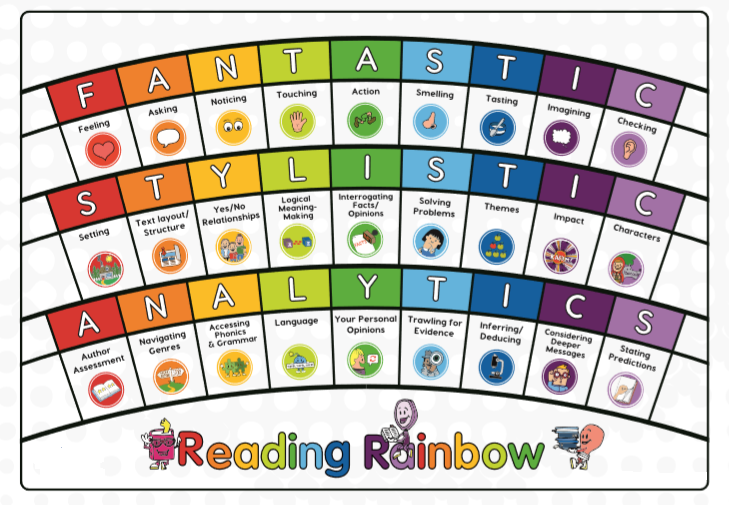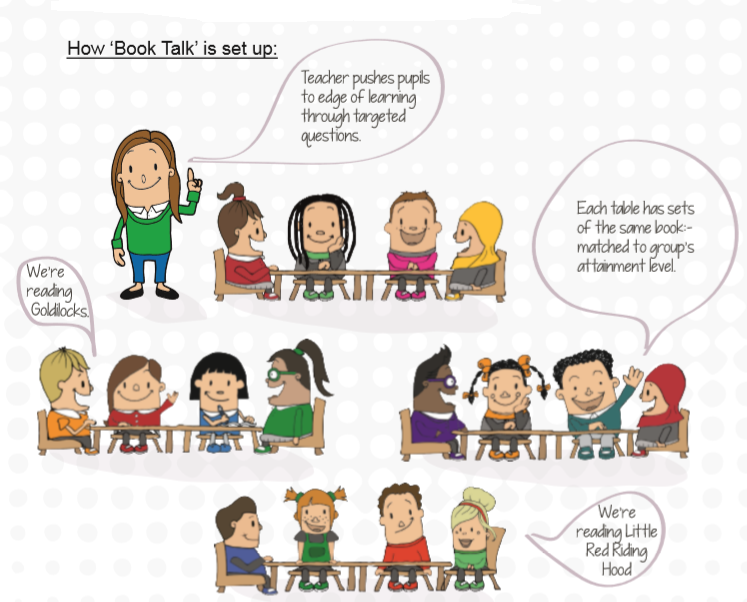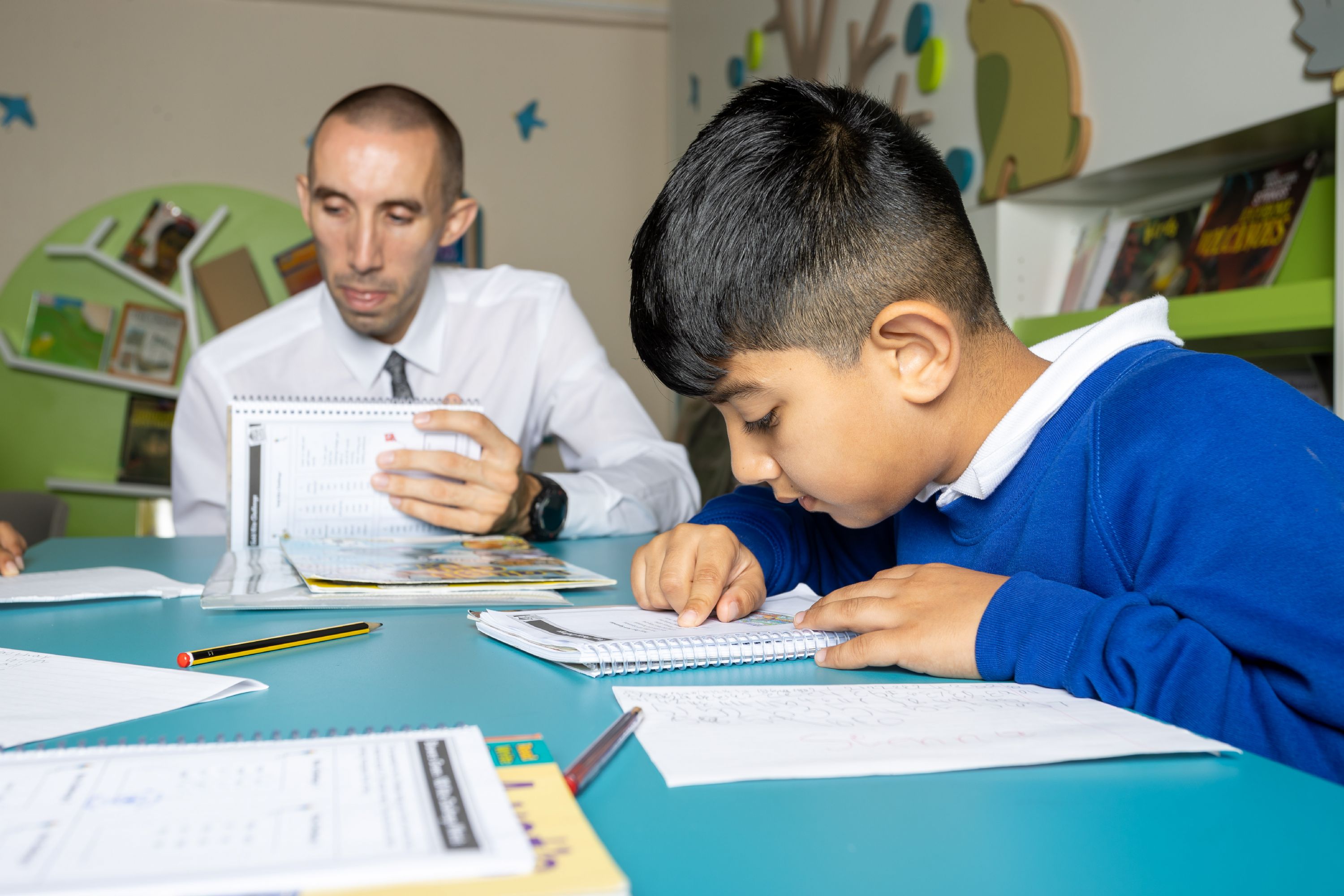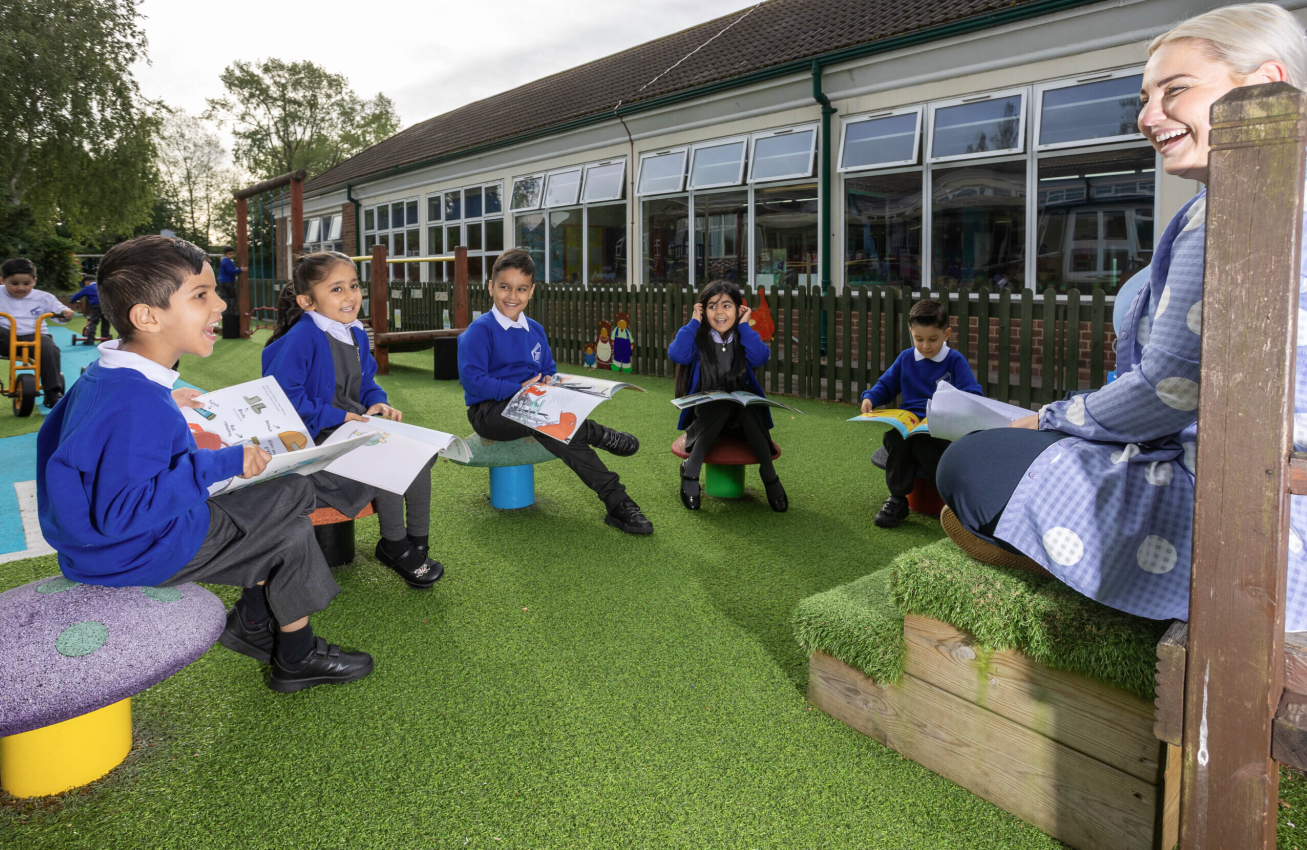Reading
‘If teachers had only one job to do, then it should be bestowing the gift of reading. Without reading, a child’s world shrinks and begins to narrow. Opportunities are limited, doors begin to close and self-esteem crumbles.’
Jane Considine
Reading Intent
At Blowers Green Primary School, our core principle is that learning to read and reading to learn, is the foundation for future educational success. The School believes in both the importance of developing children’s discrete word-reading skills and comprehension, and the need to engender their love of books and reading. The School recognises that the two elements are intertwined; each relies on the other if children are to become life-long readers.
Teaching reading is our moral duty; it is placed at the very heart of the School’s curriculum. Reading is fundamental in modern society and shapes us as critical thinkers, learners and questioning citizens. The School believes that as the singular most important academic skill of our age, teachers have an obligation to ensure every pupil is a competent reader. It is the School’s conviction that the complexity of learning to read contributes to the development of children’s resilience, concentration and perseverance – traits that children need for other learning. This requires ring-fenced time that is drenched in positivity and encouragement, to support pupils of all abilities.
There is an insistence at Blowers Green Primary School that reading is taught daily with a verve that instils excitement and pleasure. Underperformance is tackled ‘head on’ and ensures that all pupils are readers with an in-depth knowledge of how the written word functions, informs and shapes understanding.
The School’s experience shows that children benefit hugely by exposure to books from an early age. Right from the start, lots of opportunities are provided for children to engage with books that fire their imagination and interest. They are encouraged to choose and peruse books freely as well as sharing them when read by an adult. Enjoying and sharing books leads the children to seeing books as a source of pleasure and interest and motivates them to value reading.
OUR CHILDREN’S READING CHARTER
Our children are entitled to a first class reading curriculum which enables them to:
-
Develop excellent phonological awareness in order to decode, blend and segment words to become fluent readers
-
Develop reading skills such as skimming, scanning, visualising, summarising, understanding and comprehension
-
Have exposure to high quality model texts from a range of cultures, times and genres
-
Develop their knowledge and use of an extensive and rich vocabulary
-
Experience and access the wider world to develop their cultural capital through reading a rich and varied range of texts
-
Have a life-long love of reading for pleasure
‘A book is a dream that you hold in your hand’
Roald Dahl
Reading Implementation
Blowers Green Primary School is determined that every pupil will learn to read, regardless of their background, needs or abilities. Statutory requirements for the teaching and learning of reading are laid out in The National Curriculum in England Framework Document for Teaching, September 2014 and the Statutory Framework for the Early Years Foundation Stage, September 2014.
The Programmes of Study for Reading at Key Stages 1 and 2 consist of two dimensions:
-
Word reading
-
Comprehension (both listening and reading)
Teaching focuses on developing pupils’ competence in both dimensions; different kinds of teaching are needed for each. School ensures that reading, including the teaching of systematic, synthetic phonics, is taught on entry to the School, quickly so children are able to segment and blend quickly.
Blowers Green Primary School has developed sufficient expertise in the teaching of phonics and reading that ensures consistency year on year.
School ensures that the assessment of pupils’ phonics progress is sufficiently frequent and detailed to identify any pupil who is falling behind the programme’s pace, so that targeted support can be given immediately.
EARLY READING – PHONICS – ‘CRACKING THE CODE’
At Blowers Green Primary School, phonics is considered a critical part of a pupil’s reading journey and in the early stages of reading development, there is an insistence that it is taught in a fun, fast and furious way. At Blowers Green, the place of a systematic synthetic phonics programme is part of a rich and varied reading programme to support children to apply their phonic knowledge and skills, as well as develop their reading comprehension.
The School is insistent that phonics has a vital role in providing pupils with the most direct route to becoming skilled readers. The Rose Review, published in 2006 (DfES) defined ‘high quality systematic phonic work’ as teaching emergent readers the following;
-
Grapheme/phoneme (letter/sound) correspondence in a clearly defined, incremental sequence
-
The highly important skill of blending (synthesising) phonemes in order, throughout a word, to read it
-
The skill of segmenting words into phonemes to spell
-
That blending and segmenting are a reversible process
The above guiding principles by Sir Jim Rose, 2006 fundamentally underpin phonics teaching at Blowers Green Primary.
The school’s Phonics Policy, details the school’s specific approach to teaching phonics based on Ruth Miskin’s Read, Write Inc.
DAILY BOOK TALK - Teaching the Skills of Reading
At Blowers Green Primary School, daily reading from Years 2-6, is taught through ‘Book Talk’, an initiative supported by Jane Considine’s methods taken from her research entitled ‘Hooked on Books’. During these sessions, the pleasure principle of reading is fostered, and highly engaging picture books are used in favour of phonic based books to heighten engagement and excitement.
Book Talk is sharply focussed on reading for meaning, listening to other pupils read and talking about books. Book Talk is not a casual thing, although it might appear that way to an untrained eye. A visitor walking into a classroom at Blowers Green Primary School is likely to find a lively atmosphere, a babble of multiple conversations, little to no writing and pupils reading from a range of different books. Although Book Talk feels relaxed and enjoyable for the pupils involved, it is highly structured in a very clear way.
The School’s intent is that good readers and quality reading tasks need to follow lines of enquiry and focus on one area in depth. This allows pupils to develop answers that are detailed and well supported. Book Talk is based on active reading – when pupils are proactively seeking to comment on a line of enquiry and do all they can, in relation to the text, to bring forward a compelling and vigorous case.
Pupils can then see their teacher model (often with another adult in ‘devil’s advocate’ mode) to challenge lines of enquiry – so pupils can witness first-hand how to argue a point and use counter evidence to strengthen their suggestions and conclusions. It is the School’s intent that the more pupils invest in reading with a ‘switched on’, excited mind, the more they will benefit and see the gains of working and thinking in this way. The School believes that strong habits of discussion build resilience in dealing with opposing views and taking on board reasoned arguments from their teacher and their peers.
THE BENEFITS OF BOOK TALK
-
Differentiated from the outset through ability-linked books
-
Strengthens comprehension strategies as pupils ‘talk’ their structured answers.
-
Plugs gaps in vocabulary, by insisting pupils use the language of comprehension. Cohesive, ‘high utility’ words are given to support the explanation of ideas.
-
Enables children to see how the skills of reading can be applied to multiple contexts
-
Builds confidence through an interactive process of extracting language and constructing meaning.
FREQUENCY AND DURARTION
At Blowers Green Primary School, Book Talk happens in every classroom from Year 1 to Year 6 every day. Timetabling of sessions is completely at the teacher’s discretion. Half an hour is required for each session and this applies to all age groups. All sessions are split into three 10 minute chunks.
THREE REASONS TO READ
The Reading Rainbow which represents the full repertoire of reading skills (see below) supports the teaching of Book Talk and is used to direct and shape the focus of each 10 minute chunk.
Book Talk sessions are driven by the three reasons to read (the three layers of the Reading Rainbow as shown in the table below)
|
First reason to read |
Fantastic |
10 mins |
|
Second Reason to read |
Stylistic |
10 mins |
|
Third reason to read |
Analytics |
10 mins |

DIFFERENTIATING A BOOK TALK SESSION

Children sit in a reading attainment group and the classroom is set up in such a way that approximately five groups are created.
The teacher begins by announcing the first reason to read and chooses a ‘focus group’. Teachers then work with the focus group to support and assess pupil’s reading abilities.
ORGANISING GROUPS FOR BOOK TALK
For every 10-minute chunk, there are three possible ways pupils are organised:
-
Each ‘team member’ reads a section each – maybe one or two sentences or a paragraph.
-
Pairs engage in ‘shoulder to shoulder’ reading. This keeps noise levels down by preventing the voice projection that occurs when pupils are ‘face to face’.
-
Pupils read in their heads, or if they are younger, ‘whisper read’ to themselves.
Outlined below is the broad shape of a 10 minute chunk:
-
The first reason to read is announced by the teacher – a reason from the FANTASTIC layer for example, the reason is Action. All groups are asked to read their books, noticing particular moments of action.
-
The teacher announces, for example, that this will be a ‘group’ reading session. Each group member reads three sentences, looking out for moments of action. This runs for approximately 7 minutes.
-
During this time, the teacher sits with one group, observing their reading and making assessment notes.
-
The teacher calls the whole class to attention and sets a time period for groups to talk about their findings.
This part of Book Talk is tightly structured: to support pupils in framing formal comprehension answers in ‘talk’. At this point, a sentence starter is provided and answers are formulated in groups.
PUPIL INCENTIVES
Pupils have the chance to win four team points during every Book Talk chunk. Groups are given 2 minutes of talk time to construct their spoken comprehension answers, along with strict rules for structuring them:
-
The sentence starter must be used – 1 point
-
Answers must relate to the group’s book – 1 point
-
Textual evidence must be quoted or illustrations explained – 1 point
-
A Book Talk bonus point is ‘up for grabs’ for using language comprehension words appropriately.
This format is repeated for the second (STYLISTIC) layer and third (ANALYTICS) layer – the only variation being if the teacher wishes to introduce either the paired or silent reading methods.
As the week progresses, the teacher sits with a different reading group each day and they become the focus group for detailed assessment notes.
PLANNING BOOK TALK SESSIONS
Book Talk is planned on a daily basis.
THE IDEAS OF READING: The FANTASTICs
Many children find it difficult to seek out information that cannot neatly be summed up or found easily from the text. At Blowers Green Primary, the ‘FANTASTIC’ approach packages every single writing idea into one of nine child-friendly categories. FANTASTIC is an acronym that captures the nine ideas of reading.
The nine lenses include:
-
The 5 senses: Noticing (i.e. seeing), Touching; Smelling; Tasting and Checking (or hearing)
-
2 specialist lenses: Action (events) and Asking (dialogue/speech)
-
2 implicit lenses: Imagining (thoughts), and Feelings (emotions and internal dialogue). These 2 lenses help us to focus on character’s unique personalities and motivations.
Pupils only have these 9 lenses at their disposal. Once pupils are introduced to the FANTASTICS in reading, they are able to identify the ideas of reading and the choices writers have made to explore those ideas. Awareness of the FANTASTICs also enables pupils to learn new vocabulary as well as grouping and sorting words more effectively.
THE UNDERSTANDING OF READING: THE STYLISTICS
At Blowers Green Primary, staff know that all pupils, at all stages in their learning, need support with truly comprehending what they are reading. The ability to delve deeper, going below the surface of the text is supported by the use of the Reading Rainbow. To teach and promote basic comprehension skills, the middle tier of the Rainbow, the Stylistics are used. STYLISTIC is an acronym that shows pupils the many different layers that exist in a text.
THE ANALYSIS OF READING: THE ANALYTICS
Finally, each Book Talk session concludes with The Analytics. The Analytics lenses are on the bottom arch of the Reading Rainbow, are the most challenging aspects of reading comprehension for pupils. ANALYTICS is an acronym representing the higher order skills of reading such as inferring, deducing and making predictions.
ASSESSMENT OF READING
At Blowers Green Primary School, assessment is an integral part of the learning process. Through close observations and conversations, teachers build a comprehensive picture of the progress and learning needs of each child, which ultimately leads to improved teaching and learning. Teachers assess children’s work in reading in three phases. The short-term assessments that teachers make as part of every lesson help teachers to adjust their daily plans. Teachers match these short-term assessments closely to the teaching skills. Teaching staff use termly, medium-term assessments to measure progress against the key skills to help plan for the next unit of work.
Teachers make long-term assessments towards the end of the school year and use these to assess progress against school and National age-related expectations. With the help of these long-term assessments, teachers are able to set targets for the next school year and summarise the progress of each child before discussing outcomes with the child’s parents/carers. The next teacher also uses these long-term assessments as the basis for planning work for the new school year.
At Blowers Green Primary, reading judgements are, in the main, made ‘live in the moment’ during reading activities. The ‘Performance of Reading Tool’, is used by each class teacher and provides a detailed breakdown of all the reading competencies and skills to be mastered by each age group. The tool is also used to track progress from Year 1 to Year 6.
A broad range of skills are organised hierarchically, from Progressing Towards through On Track to Way Ahead. As teachers work with their daily focus groups, each ‘reason to read’ has associated ‘I can’ statements, which are both age-related and differentiated.
The Performance of Reading Tool helps to shape teacher assessment, which the School ensures is based on a broad range of evidence such as observing pupils at the point of reading, discussions about what the children have read, oral and written interactions with texts, as well as a rich selection of the children’s reading across a range of subjects.
Children undertake the National reading tests at the end of Year 2 and Year 6. Teachers also make annual assessments of children’s progress using age related expectations that are set out in the National Curriculum.
Impact
The whole school approach to planning for the reading curriculum reflects the recommendations and statutory requirements of the National Curriculum, 2014 and the Statutory Framework for the Early Years Foundation Stage, September 2014. Assessment is ongoing and informs future planning; it is in line with the guidelines set out in the School’s assessment policy.
The agreed programme of work at Blowers Green Primary ensures continuity, progression and differentiation to ensure all pupils, including the weakest readers, and those with SEN, make sufficient progress to meet or exceed age-related expectations.
Promoting the pleasure principle of reading
At Blowers Green Primary, there is a cumulative effect of many different strategies that show pupils, that as a School, we care about reading.
Reading enthusiasm is modelled by teachers and visitors to the School. School engages in and celebrates the festivals of World Book Day, Children’s Book Week and National Poetry Day.
Parental engagement in children’s reading is highly valued at Blowers Green Primary. In the Early Years Foundation Stage (EYFS), weekly ‘DEAR’ sessions, ‘Drop Everything and Read’ are run by the School’s Early Years’ practitioners to model to parents and carers how to read stories and poems in a lively, energetic, thus, meaningful way to their children.
Story time is considered as an incredibly valuable part of children’s daily routine so is timetabled for 10 minutes daily. Every classroom has an exciting and engaging reading corner designed to promote a love of reading. Children have access to a variety of genres available with a large selection of books that link directly to the topics that they are currently studying. Children are encouraged to use their reading area at different times throughout the day. Reading for pleasure is also promoted through daily story time, which offers children the chance to experience different authors and simply immerse themselves in language.
Home Reading
On entry to Reception, children take home books from Ruth Miskin’s Read Write Inc reading programme, books which are organised according to the sounds and letters children have been taught. This makes it easy for teachers, parents and children to choose a text that is matched to a child’s growing phonic knowledge. Thereafter, Home Readers follow a well-managed reading scheme that is organised according to the growing complexity of the sounds within them, develop children’s fluency so that decoding of the words on the page become automatic – a critical foundation for independent reading.
The sequence of reading books at Blowers Green shows a cumulative progression in phonics knowledge that is matched closely to Read Write Inc. Teaching staff give pupils sufficient practice in reading and importantly, re-reading books that match the letter/sound correspondences that pupils know, both at school and at home.
School also ensures that the children’s home reading record is a highly valued home/school journal that ensures participation in reading is the most important activity that parents engage in. It is the School’s homework policy that 10 minutes of daily reading is the requirement – this is closely and regularly monitored by the senior leadership team with feedback and incentives to motivate the children further.
Children also have access to a range of books from our school Library. They not only spend time with their class enjoying the books within the library but also can take library books home to explore with their families. This helps to develop individual preferences and interests.
READING CHALLENGES
Children from Years 2-6 have the opportunity to read an extra 6 books throughout the year and answer a set of questions in order to gain their Reading Challenge Badge.

INDIVIDUAL READING
As younger pupils are developing reading fluency, frequent opportunities to practise reading 1-1 with an adult are provided. In addition to regular opportunities to read individually to an adult, as fluency is established in KS2, teachers also plan for independent reading activities during discrete literacy teaching, during reading sessions and in the context of other subjects. Texts are selected so that pupils can access them without support. The focus for the independent reading is to provide practise, to develop personal response to text and crucially, reading for purpose and pleasure.
Many other opportunities are provided for pupils to practise and extend reading in other subjects. Pupils select texts under the guidance of the teacher for independent and home/school reading. Teachers monitor independent reading and discuss progress with individual pupils on a regular basis. Benchmarking is carried out periodically to ascertain where pupils are working below age related expectations and interventions will support pupils as appropriate. Reading Partners provide additional support for children in all groups
